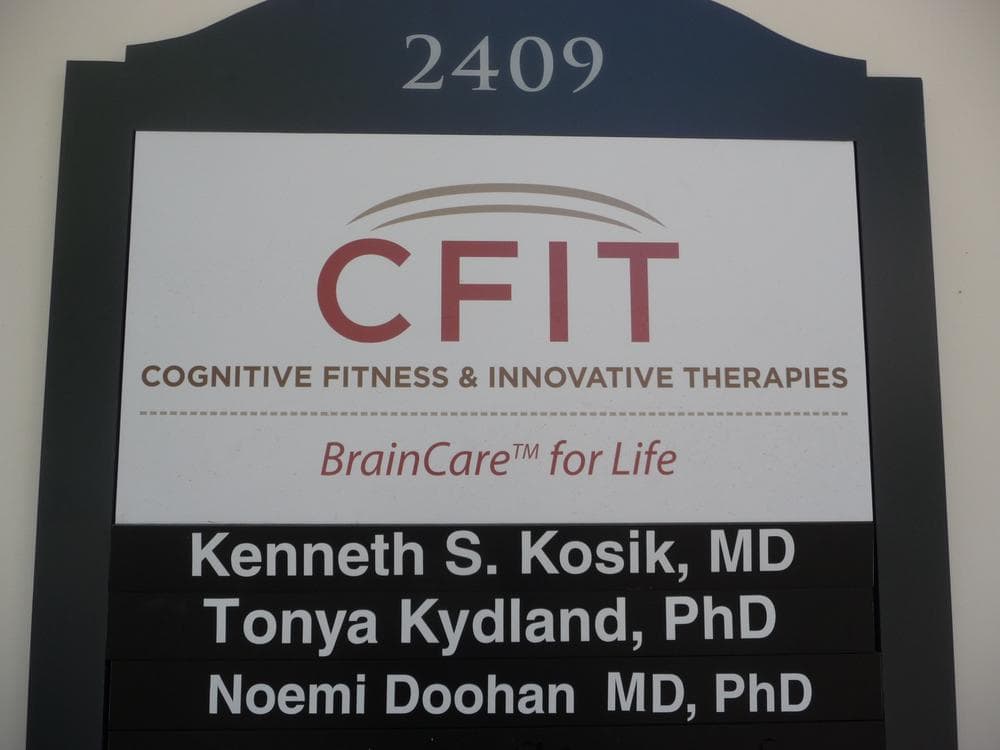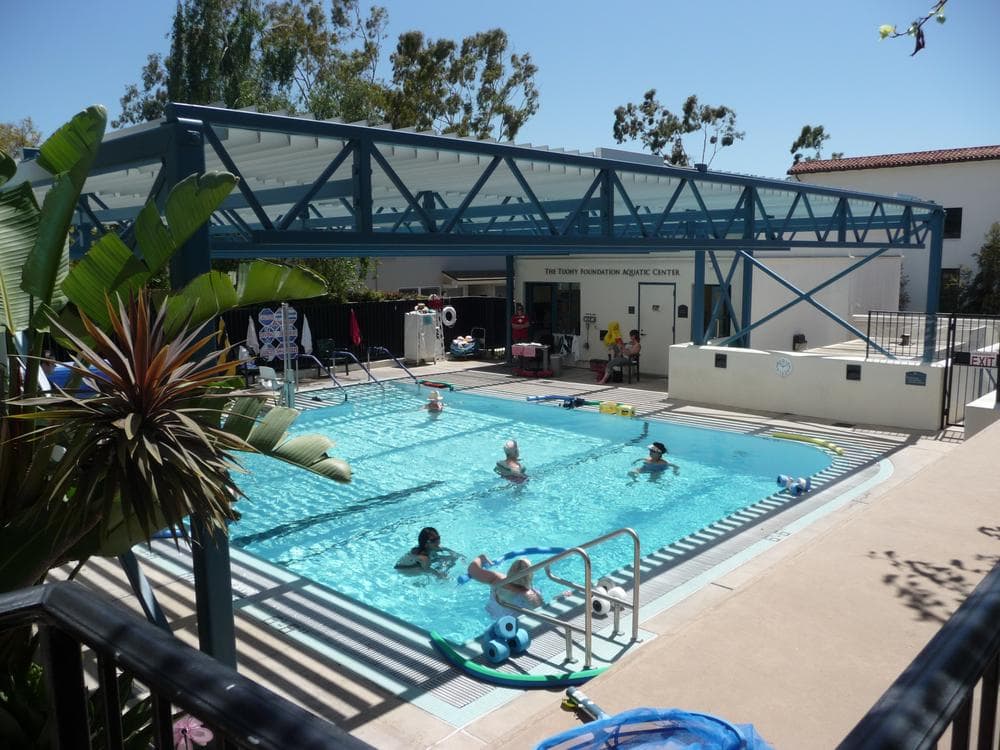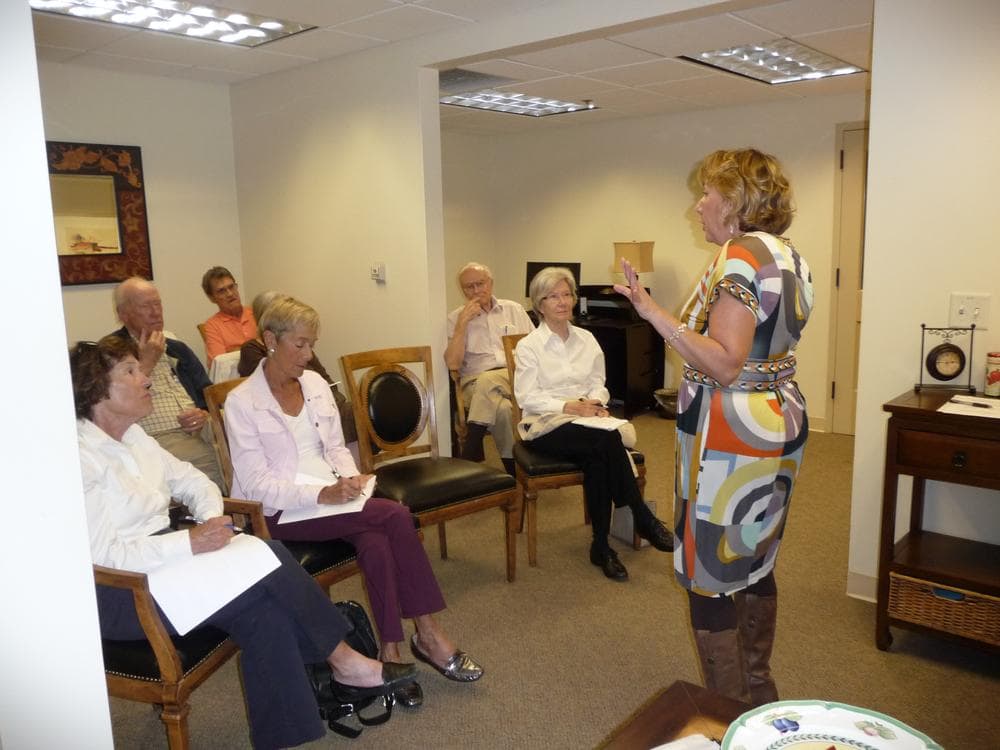Advertisement
Helping Seniors Stay Sharp Through Music Therapy And Fitness
Resumehttp://www.youtube.com/watch?v=YMcjNgK_oG8
Currently about 5.4 million American suffer from Alzheimer's disease, and as the baby boomer population ages, it's estimated that by the year 2050 that number will at least triple. Researchers are desperately seeking treatment, or a cure, but in the mean time, a non-profit facility in Santa Barbara , California is working to reduce people's risk of developing the disease in the first place. It's called CFIT, which stands for Cognitive Fitness and Innovative Therapies. Many call it a "brain gym", as it utilizes everything from board games to Wii Fit to music therapy to give the brain a good work out.
Doctor Ken Kosik is a neurologist, a professor at the University of California Santa Barbara , and a leader in Alzheimer's research. He founded CFIT two years ago with the idea that people don't have to live in fear of developing Alzheimer's, and that relatively simple lifestyle measures can be taken to reduce risk, while improving quality of life. None of CFIT's clients has the disease, and most show little or no sign of cognitive decline. And while Dr. Kosik can't say for sure whether his program prevents Alzheimer's, he says there is plenty of evidence that CFIT reduces one's risk for developing the disease, and perhaps delays its onset. Producer Karen Pelland brought us the story, transcript below.

Karen Pelland: Bill, Bob, Mickey, and Barbara sit in a circle, holding paddle drums in one hand, and mallets in the other. They’re told to bang their own drum four times, then reach over to bang their neighbor’s drum four times - back and forth - in unison. A music therapist creates a rhythm, but when she sings, the once steady drum beat deteriorates quickly.
The drummers look frustrated, but they’re clearly having fun. And they believe this simple musical challenge can help reduce their risk of developing Alzheimer's. They’re members of a unique non-profit group for people who show little or no signs of the disease. It's called CFIT, which stands for Cognitive Fitness and Innovative Therapies.
Dr. Ken Kosik: "We like to say we are reducing people’s risk factors…whether or not that also results in a delay in the onset or prevention, we don’t know for sure."
Karent Pelland: Doctor Ken Kosik is a neurologist at the University of California Santa Barbara, and a leader in Alzheimer’s research. He founded CFIT two years ago with the idea that people don’t have to live in fear of developing the disease that, in addition to addressing certain known medical risks, like high blood pressure or cholesterol, a few simple lifestyle changes could be very helpful.
Dr. Kosik: "We assess how much exercise the person is getting, if they have a very sedentary lifestyle we develop an exercise program, either on site, or at home… because, of the various lifestyle measures that one can take that I think will make a difference in risk reduction, the evidence is probably best for exercise."
CFIT also evaluates nutrition, stress levels, and making sure clients have plenty of cognitive challenges in their lives.
Dr. Kosik: "Now we’re not just talking about crossword puzzles or Soduko, we’re actually talking about really significant challenges, whether it’s learning to play an instrument or learning a foreign language, or even doing things that involve complicated social activities like setting up a dinner party for people.
Karen Pelland: This sounds like exercise for the brain.

Dr. Kosik: "Very very much so… You know, the brain really enjoys tasks, and particularly vulnerable with aging are tasks that we have to sequence… that is, you need to do one thing after another, in the correct order, like preparing a meal."
Throwing a dinner party also addresses another risk factor. Dr. Kosik says having friends and an active social life is great brain exercise. CFIT’s spacious facility has an open, community feel to it. And nestled amid palm trees and bubbling fountains, it currently has about sixty clients.
Adrienne Girod: "I used to think everything was Alzheimer’s, you know, the smallest little forgetfulness - I’d think, oh my God, it’s here!"
75-year old Adrienne Girod has been coming to CFIT for two years, and she’s extra concerned about her future because she inherited the genetic marker for Alzheimer’s from her mother.
Adrienne Girod: "She had alzheimer’s for 15 years, and spent the last several years in a vegetative state. It drained all of our resources in every way. I don’t want to do that to my family."
Karen Pelland: And You’ve been tested for the indicator gene…
Adrienne Girod: Yeah.
Karen Pelland: And how did it make you feel when you got that positive result?
Adrienne: "Well, what they did is they gave me my chances… you know, ‘with this gene you have a higher chance than the random population’, and for me it turned out to be, like, near 40% by age 80. But you know that gives you 60% to play with… what I thought was a sure thing is a possibility I could avoid that. And actually, I’ve been tested four times in the last two years, and I’m at the same level I was two years ago, and I know that I’m actually better in some ways."
Karen Pelland: In what ways?

Adrienne Girod: I just feel more alert and more focused. It’s easier for me to focus now because I pay attention to that.
Karen Pelland: And so when you come here, what are some of the activities you participate in and maybe some that you like better than others?
Adrienne Girod: Yeah, I do just about everything they offer. I do the music, I did the tai chi, which I found very calming. I go to the lectures - the hormone lecture and the nutrition lecture.
Karen Pelland: What would you say to others who might say, oh, prevention or risk reduction is kind of a lost cause, it’s a fait de complis, let’s focus on treatment. What would you say to those people?
Adrienne Girod: I think they’re wrong, decidedly wrong. Because, when I got into this I started doing crossword puzzles and hiking and changing my lifestyle, eating better, and what it’s done is… I’ve sort of tuned in instead of tuned out. And while I was on a sort of coasty floaty road that said oh, this is going to hit me some day… now, I've improved the quality of my life so much, in an effort to avoid this, that I have a better quality of life! So do it for what it does for you now, not only for what it might do for you down the road.
Karen Pelland: But CFIT might not be for everyone - if only because it’s not cheap. Initial client evaluations are $18-hundred dollars. Gene testing is another $18-hundred, and memberships average about $2-hundred a month. But that pales in comparison to the costs of treating Alzheimer’s in a hospital or assisted living setting, and CFIT founder Doctor Ken Kosik says it would be worth a relatively small investment to replicate brain exercise programs like CFIT in communities across the country.
Dr. Kosik: "There’s no cure for this disease around the corner, so what do you want to do while we’re waiting for that to happen? There aren’t very many options. But there is enough evidence that we can at least begin to introduce into our communities the idea that these kind of measures can help a lot of people."
Karen Pelland: As the baby boomer generation ages, it’s estimated that by the year 2050 the number of Alzheimer’s patients in America will at least triple, and the healthcare costs to our economy and our families will be staggering. So Doctor Kosik says any effort to get ahead of the disease and fend it off… is vital — that includes the new federal guidelines allowing for earlier Alzheimer’s diagnosis, as well as a new bill in congress that has medicare paying for that diagnosis, and…perhaps a community center in Southern California working to improve people’s lives.
This segment aired on May 23, 2011.